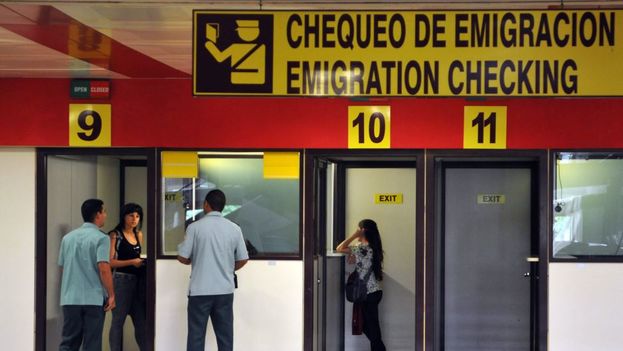
![]() 14ymedio, Regina Coyula, Havana, 1 August 2017 — I should be in Panama right now. But on July 31, when I showed up at the desk at José Martí International Airport, I was shown to an office where an Immigration officer informed me that I could not travel because I was “regulated.” The word has unpleasant connotations because the most frequent regulation in Cuba is menstrual regulation. In any case, questioning that official about the cause of such a ban was futile. She did not seem to know anything beyond the bad news, and it is logical that she does not have the details, given the way compartmentalization works (or is supposed to work) within the Ministry of the Interior.
14ymedio, Regina Coyula, Havana, 1 August 2017 — I should be in Panama right now. But on July 31, when I showed up at the desk at José Martí International Airport, I was shown to an office where an Immigration officer informed me that I could not travel because I was “regulated.” The word has unpleasant connotations because the most frequent regulation in Cuba is menstrual regulation. In any case, questioning that official about the cause of such a ban was futile. She did not seem to know anything beyond the bad news, and it is logical that she does not have the details, given the way compartmentalization works (or is supposed to work) within the Ministry of the Interior.
I can deduce with confidence that this measure comes from the department that “attends” opponents of the government, known as Section 21 or the Directorate of Counterintelligence Confrontation. In order to know why I was “regulated,” the old retirement villa of the Marist Brothers in La Vibora district, known Villa Marista, is the place where the questions are asked.
An officer on duty (‘visitor’, I think they call him) was responsible for hearing my complaint and handling the response. The officer dialed the phone and asked for Lieutenant Colonel Kenia, and explained that I was standing in front of him asking about the reasons for the “regulation.” On the other end of the phone, the person asked for my name and surnames, and after a pause the response was disconcerting: Section 21 is not responsible for my ban on leaving the country.
I, who have an idea – an old idea but an idea at least* – of how counterintelligence works, know that if you do not have a traffic ticket or a charge against you for stepping on the grass, and if you do not work for any state agency, but you do engage in independent and critical journalism, the cabals mark 21.
But the visiting officer, very convinced that my meager record of opposition did not qualify me for the league of 21, suggested that I visit the offices of Attention to the Citizenry for Immigration where – and these were his words and not my interpretation – they would tell me who had “regulated” me and why.
After a few stumbling blocks with the leadership of the place, I arrived at 20th Street near the corner with 7th, in Miramar. I did not omit any details speaking to the official who received me and I was direct: I went to Mexico on June 26, invited to a political meeting and I was not allowed to travel.
At the time I did not inquire about the measure, because it seemed to me part of a strategy to abort or disrupt the meeting since, like me, a large group of would-be attendees was left on land by decision of the authorities. But this July 31, I was not going to a political meeting, I was going to the Latin American and Caribbean Internet Governance Forum, an event sponsored by the United Nations. As I do not belong to any party and I am the leader only of my own opinions, I wanted to know by whose orders and why I remained “regulated.”
The official, a captain, clarified for me first thing was the mistake of the Villa Marista officials; they could not give me information about who decided this part of my life and why, but she would consult on my case with her superior, a lieutenant colonel and head of the Department of Attention to Citizenship.
I spent the wait of 40 or 50 minutes reading. Then the captain wrote down my version and put my phone number at the bottom of the page. She then informed me that the bosses had made the decision to “deregulate” me starting on Wednesday.
“That is, I can get on a plane at one in the morning on Tuesday/Wednesday?”
The captain said yes, and, cheerful, added that, just in case, she would suggest doing it after eight o’clock in the morning.
I thanked her for the attention and I walked out under a tremendous downpour. Just 20 minutes after leaving the Immigration office, the phone rang. It was the cheerful captain with a counter-order: “No, you can not travel until further notice and you will be notified.”
This is when one wonders what is the idea of the political police and the guidelines they receive, because my participation in the event is not newsworthy, but my absence is.
Why is the government so sensitive when it is accused of violating human rights? What Rule of Law do they presume if they do not respect their own body of law shaped during this long authoritarianism? What are they afraid of, it the propaganda always insists that they enjoy the unrestricted and combative support of our working people?
But what am I doing asking rhetorical questions?
*Translator’s note: Regina Coyula, in an earlier stage of her life, worked within Cuba’s Ministry of the Interior
